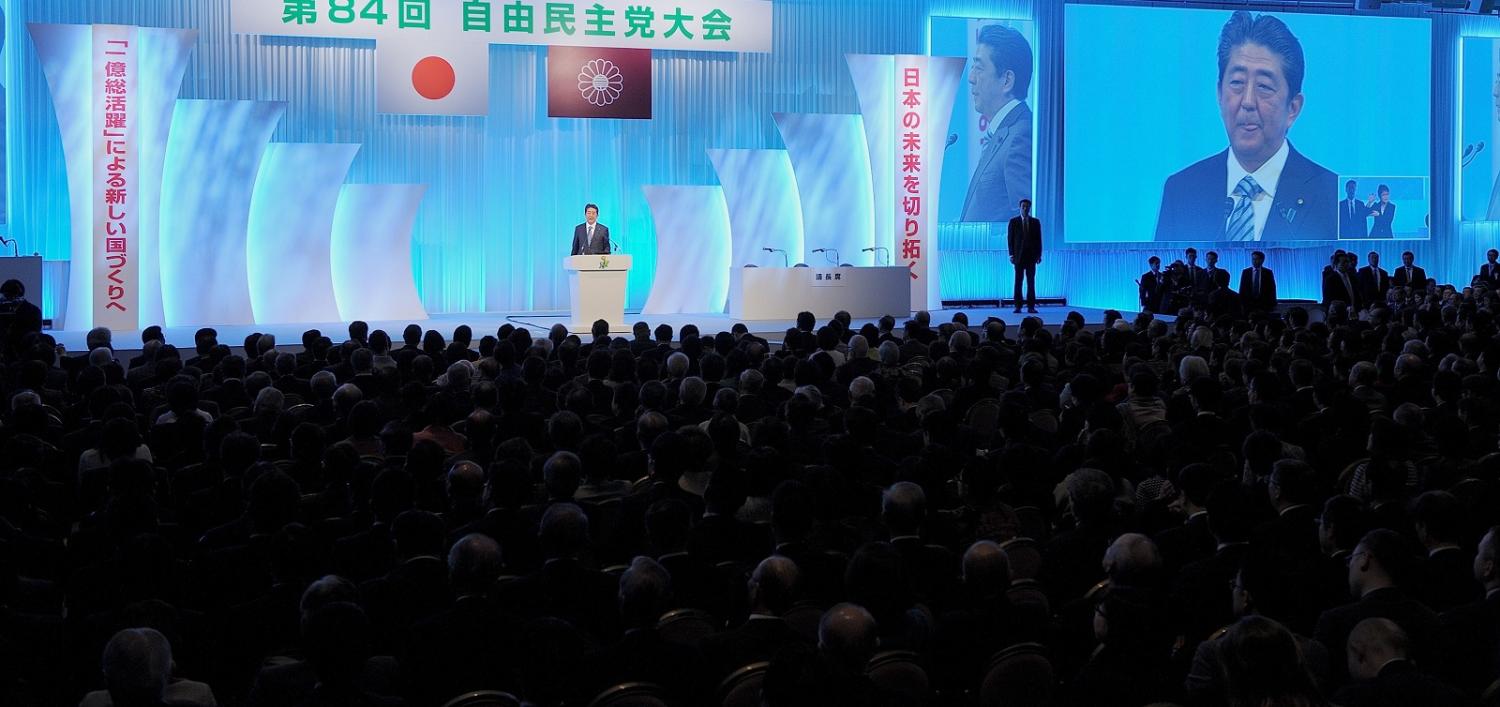This month Japan's Liberal Democratic Party (LDP) - which is led by Prime Minister Shinzo Abe - experienced its first major electoral defeat since Abe’s inauguration in December 2012. The Tomin First no Kai (‘Tokyoites First’, known as Tomin), a local political party led by the Governor of Tokyo Yuriko Koike, convincingly trounced the LDP in the Tokyo metropolitan election. Tomin won 49 of the 127 seats contested (the most of any party), while LDP went from 59 to 23 seats. Meanwhile national polls show the approval rate of the Abe Administration has dropped to around 30%.
This major slump in support comes as Abe seeks to increase Japan’s defence responsibility and capability. There is no question that Abe and the DLP face some serious challenges, but in the short term at least the PM's defence agenda is unlikely to be change markedly, given the lack of alternative to the LDP and the serious nature of Japan’s security situation.
On the domestic front, scandals and sloppy statements from LDP politicians have been gleefully seized upon by Japan’s media. There is no clear successor to Abe, which indicates an LDP overdependence on one individual. And the LDP has also not consolidated the party’s position on key policy matters, particularly on the constitutional amendment. Abe’s announcement earlier this year that he hoped these changes (which would add a paragraph to the war-renouncing Article 9 of the country's constitution to give grounds to the Self-Defense Forces) would be in effect by 2020 came as a surprise to many. This proposal differs significantly to that set out in the LDP draft revision, released back in 2012. The LDP has managed to accommodate different positions on constitutional revisions in the past but a consolidated position in the party will be essential (and soon) for maintaining the 2020 timeline.
The domestic political situation is playing out in the shadow of an increasingly serious external security environment. North Korea’s missile and nuclear developments are now a direct threat to Japan and the US. This month the Chinese Coast Guard have entered Japan’s territorial waters around the disputed Senkaku Islands in the East China Sea, in the Tsugaru Strait between Honshu and Hokkaido, and off Tsushima Island. China's ongoing militarisation of maritime features in the South China Sea following the arbitral award issued last year continues to heighten tensions.
In this environment, there is little chance of Japan cutting down on its commitment to regional security. Domestic politics has also not successfully come up with an alternative security polity to the LDP’s approach toward the rules-based regional order.
The Democratic Party (DP), the largest opposition party in the Diet, appears to have not yet regained credence among voters, winning only five seats in the metropolitan election. Aside from a lacklustre three years in power, the DP's recent cooperation with the Japan Communist Party (JCP) and its relentless criticism of the Abe Administration might alienate moderate voters. While the LDP has already lost in local elections to Ishin no Kai in in Osaka and Tomin in Tokyo, these parties are primarily focused on local issues and are not prepared to govern on a national level. The coalition partner of Ishin no Kai and Tomin at local level, Komeito, still continues to support the LDP at national level.
Japan's opposition parties also do not have robust security policies. For example, while the DP’s policy platform states it will amend the unconstitutional element in the historic 2015 legislation that allowed Japan to exercise a limited form of collective self-defence, there is no clear answer as to how it would address the emerging security challenge, or interpret the concept of collective self-defence. The DP and JCP are also opposed to the amendment of the Article 9, and the DP has also in the past backed the relocation of the US marines based in Okinawa to outside of Japan. However, the opposition parties are yet to demonstrate how they would fill the resulting power vacuum or complement amphibious deployment forces in the Ryukyu Islands without US marines. Meanwhile, the ruling coalition acquired two-third majority support in the upper house election in 2016 for the current government’s security policy. The LDP Research Commission on Security’s policy recommendations from this year suggest the government considers strengthening its counterstrike capability, and increasing defence expenditure to 2% of GDP (a benchmark referred to by the Abe Administration).
Moreover, contrary to the domestic controversy about Abe’s security policy, and the legislation for peace and security in particular, regional countries chiefly supported this legislation. The US, Australia, India as well as many Southeast Asian states have indicated support for Abe’s focus on regional security. China and South Korea have been opposed.
All this said, the Abe cabinet no longer has a free hand in foreign and security policy due to its falling approval rate. Abe has had to expend political capital on a cabinet reshuffle, disciplining party members and, most importantly, economic reforms to recover public support.
Against this background, early timing for the constitutional amendment should not be expected. According to a poll conducted by Kyodo, 32.6% of respondents support the amendments under Prime Minister Abe, while 54.8% are opposed. While there would be good reason to increase defence expenditure to be closer to 2% of GDP given the current security situations, there are other pressing demands on the budget.
Despite the LDP's recent setbacks, there is little room for a dramatic shift of foreign and security policy due to external threats and an internal lack of alternatives. Constitutional amendment is still some way down the road. While Japan’s role in protecting the rules-based regional order increases, arrogance and carelessness in the LDP has disturbed, if not stopped, the advancement of realistic security policy. Japan cannot afford to go back to a time of revolving door leadership – as the ruling party, the LDP has a duty to address public concerns about the future.

